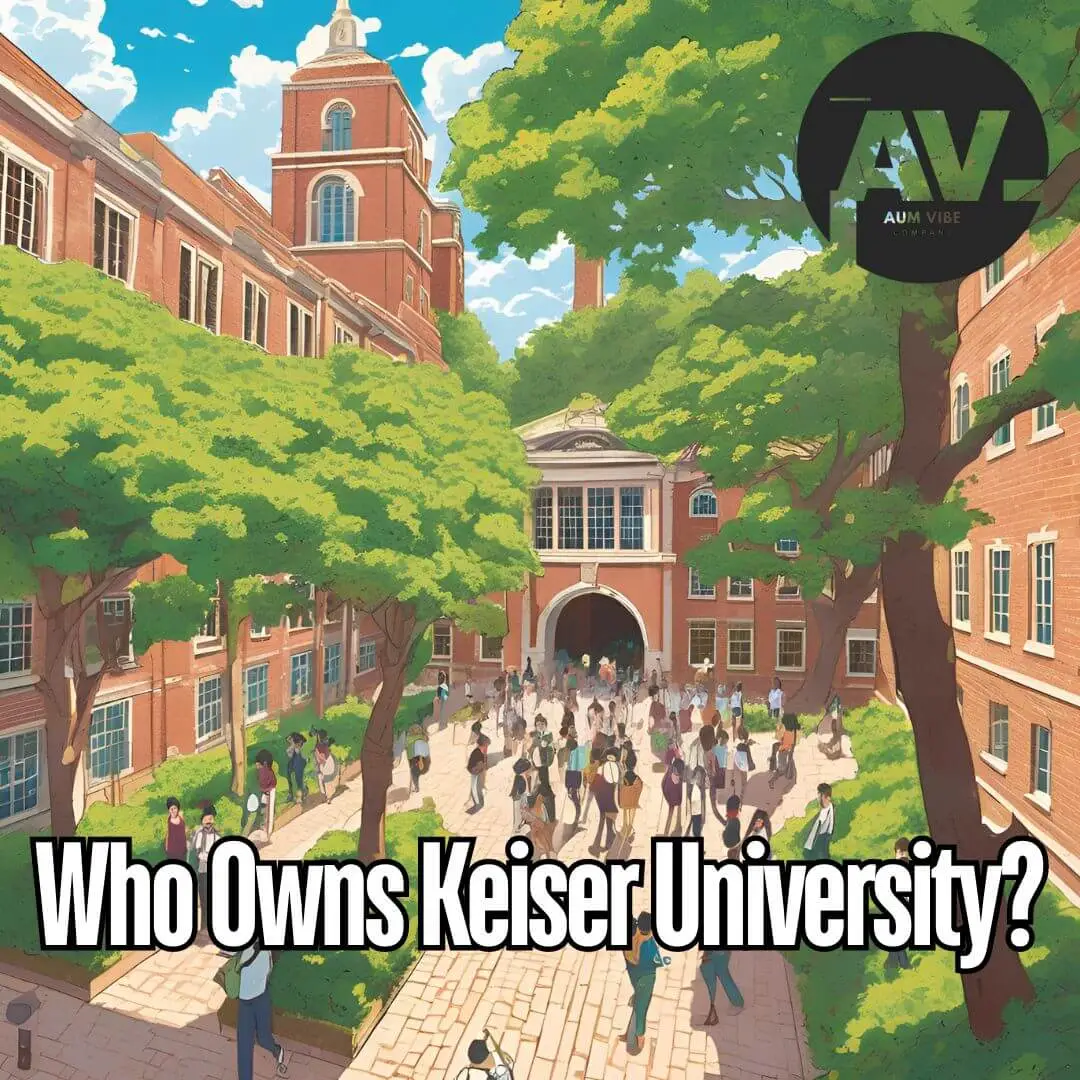
Who Owns Keiser University
Who Owns Keiser University? Keiser University, a prominent private educational institution based in Florida, has grown to be one of the state’s largest private, not-for-profit universities. Since its establishment in 1977, the university has expanded across multiple campuses and developed a significant online presence. So, exactly who owns Keiser University?
Keiser University is owned and managed by Everglades College Inc., a non-profit organization founded by Dr. Arthur Keiser, who also serves as the university’s Chancellor and CEO. Despite its non-profit status, the Keiser family retains significant influence over its operations.
Understanding who owns Keiser University involves diving into its historical background, ownership structure, and the intricate governance models that support its operations.
Who Owns Keiser University?
Who owns Keiser University? This question draws attention to the complex ownership and governance framework that underpins one of Florida’s largest private universities. Founded in 1977 by Dr. Arthur Keiser and his mother, Evelyn Keiser, Keiser University has transitioned from a small career-focused institution to a large not-for-profit university with nearly 20,000 students.
While the university’s not-for-profit status may suggest public or non-profit ownership, the role of the Keiser family continues to be deeply intertwined with its operations. This article will explore the various aspects of ownership, governance, and challenges faced by Keiser University, providing a comprehensive understanding of the institution’s current structure.
You may also like: How Many Students Attend Keiser University?
How Did Keiser University Begin? A Look at Its Historical Background
Keiser University was originally established as the Keiser School in Fort Lauderdale, Florida, with the goal of offering career-focused education tailored to the needs of the state’s business and healthcare sectors. The founders, Dr. Arthur Keiser and his mother Evelyn, envisioned a college that would equip students with the skills necessary for Florida’s growing job market.
Over the years, the institution underwent several transformations, including name changes that eventually led to its current title, Keiser University, in 2006. Its focus has always been career-oriented programs that cater to adult learners seeking skills for specific industries. In 2011, a major change occurred when the institution transitioned from a for-profit model to a not-for-profit entity. This transition brought about the involvement of Everglades College Inc., a non-profit organization also founded by Arthur Keiser, which now manages Keiser University.
What Is the Current Ownership Structure of Keiser University?
Despite being a not-for-profit institution, the ownership and control of Keiser University are closely linked to the Keiser family. Dr. Arthur Keiser, who serves as the university’s Chancellor and CEO, remains a central figure in the university’s governance. His leadership has been instrumental in shaping the institution’s growth and maintaining its emphasis on career-focused programs.
Keiser University’s ownership is tied to Everglades College Inc., the non-profit organization that officially manages the university. Arthur Keiser founded this organization, and as such, he plays a dual role in both the university and its managing body, which raises questions about potential conflicts of interest.
Family Involvement in Ownership
The Keiser family retains a significant amount of influence over the university, even after its transition to a non-profit model. In addition to Arthur Keiser’s role as Chancellor and CEO, his wife, Belinda Keiser, also plays a prominent role in several educational institutions linked to the Keiser family.
Notably, the Keisers are also involved with Southeastern College, a for-profit institution that shares administrative ties with Keiser University. This interconnectedness between the two institutions has sparked discussions about governance transparency and the potential for financial conflicts of interest.

What Role Does Arthur Keiser Play in the University?
Arthur Keiser has been pivotal to the success of Keiser University. Serving as Chancellor and CEO, his involvement extends far beyond day-to-day operations. Keiser has been instrumental in shaping the institution’s mission and maintaining its focus on providing career-oriented education to adult learners. Under his leadership, the university has expanded to offer a wide range of undergraduate and graduate programs, earning a reputation as one of Florida’s largest private universities.
However, this dominant role has also led to scrutiny. Questions have been raised about potential conflicts of interest, particularly given the family’s ownership stakes in other for-profit educational entities that overlap with Keiser University.
How Does the Governance of Keiser University Work?
Keiser University is governed by a Board of Trustees, which includes stakeholders from various sectors. The board plays a crucial role in shaping the university’s policies, ensuring that it adheres to its mission of providing quality education while maintaining financial integrity.
While the university operates under a non-profit model, its governance has been the subject of ongoing debate due to the close relationships between Keiser University and for-profit institutions owned by the Keiser family. Critics argue that the university’s leadership structure creates potential conflicts of interest, particularly with regard to financial decision-making and governance transparency.
Financial Structure of Keiser University: How Does It Operate?
The financial model of Keiser University is complex. As a non-profit institution, its primary source of income comes from tuition revenue and federal student aid. The university’s economic footprint is significant, with an annual impact exceeding $3 billion in Florida alone. Keiser University also employs approximately 3,800 staff members, underscoring its role as a major educational institution in the state.
Since its transition to non-profit status in 2011, the university has demonstrated a commitment to increasing access to education through scholarships. It has awarded nearly $76 million in scholarship funding, reflecting its goal of making education more affordable for students from various backgrounds.
What Are the Challenges Faced by Keiser University?
Like many institutions, Keiser University has faced its share of challenges. One major issue has been allegations of predatory recruitment tactics, which have led to investigations by regulatory bodies. These accusations, coupled with questions about the financial practices of for-profit entities tied to the Keiser family, have placed the university under scrutiny.
Additionally, Arthur Keiser’s involvement in both Keiser University and other for-profit entities has raised concerns about financial governance. These overlapping interests have led to legal disputes and accusations of unethical practices, adding to the complexity of the university’s operational model.
Accreditation and Recognition: How Is Keiser University Ranked?
Despite the challenges, Keiser University has achieved several milestones in the academic world. The institution is accredited by the Southern Association of Colleges and Schools Commission on Colleges (SACSCOC), which allows it to award degrees at multiple levels, from associate to doctoral degrees.
Keiser University has also been recognized for its commitment to social mobility, earning high rankings in U.S. News & World Report. This recognition highlights the university’s efforts to serve diverse student populations and provide accessible education, despite the controversies surrounding its ownership and governance.
Frequently Asked Questions FAQs – Who Owns Keiser University
1. Who owns Keiser University?
Keiser University is owned by Everglades College Inc., a non-profit organization founded by Arthur Keiser, who also serves as Chancellor and CEO.
2. What role does Arthur Keiser play in the university?
Arthur Keiser is the Chancellor and CEO of Keiser University, playing a key role in shaping its policies and expansion.
3. Is Keiser University a for-profit or non-profit institution?
Keiser University transitioned from a for-profit to a non-profit model in 2011.
4. What is the financial impact of Keiser University in Florida?
Keiser University has an annual economic impact exceeding $3 billion within Florida and employs around 3,800 staff members.
5. What challenges has Keiser University faced?
The university has faced allegations of predatory recruitment tactics and concerns about governance transparency due to the Keiser family’s involvement.
6. How does the Keiser family influence the university?
The Keiser family, particularly Arthur and Belinda Keiser, retains significant influence over the university through ownership of related educational entities.
7. What types of programs does Keiser University offer?
Keiser University offers a wide range of programs, from associate to doctoral degrees, focusing on career-oriented education.
8. What is the relationship between Keiser University and Southeastern College?
Keiser University and Southeastern College share administrative ties, both owned and operated by the Keiser family.
9. What recognition has Keiser University achieved?
Keiser University is ranked highly in social mobility by U.S. News & World Report, reflecting its efforts to support diverse student populations.

Conclusion
In summary, Keiser University is a not-for-profit institution primarily overseen by Arthur Keiser through his dual roles in both the university and Everglades College Inc. Despite its non-profit status, the university’s governance remains closely linked to the Keiser family’s interests, particularly their involvement in for-profit educational entities. As the university continues to grow and evolve, it will need to navigate challenges related to governance transparency, while maintaining its mission of providing career-oriented education to students across Florida and beyond.
This intricate web of ownership, family involvement, and financial interests makes Keiser University a unique case in the world of higher education, one that continues to raise important questions about governance in not-for-profit institutions.






